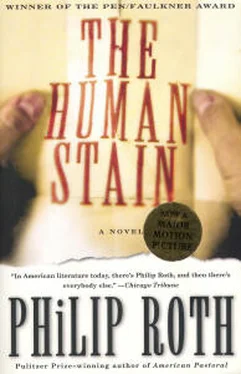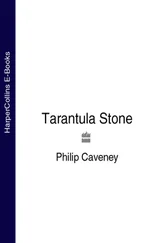The nobody Faunia turned out mostly to be referring to was Lester Farley, her ex-husband. Not that she'd been knocked around in her life by this man alone—“How could I be, being out there on my own since I was fourteen?” When she was seventeen, for example, and down in Florida waitressing, the then-boyfriend not only beat her up and trashed her apartment, he stole her vibrator. “That hurt,” Faunia said. And always, the provocation was jealousy. She'd looked at another man the wrong way, she'd invited another man to look at her the wrong way, she hadn't explained convincingly where she'd been for the previous half hour, she'd spoken the wrong word, used the wrong intonation, signaled, unsubstantially, she thought, that she was an untrustworthy two-timing slut — whatever the reason, whoever he might be would be over her swinging his fists and kicking his boots and Faunia would be screaming for her life.
Lester Farley had sent her to the hospital twice in the year before their divorce, and as he was still living somewhere in the hills and, since the bankruptcy, working for the town road crew, and as there was no doubting that he was still crazy, she was as frightened for Coleman, she said, as she was for herself, should he ever discover what was going on. She suspected that why Smoky had so precipitously dumped her was because of some sort of run-in or brush he'd had with Les Farley — because Les, a periodic stalker of his ex-wife, had somehow found out about her and her boss, even though Hollenbeck's trysting places were remarkably well hidden, tucked away in remote corners of old buildings that no one but the boss of the college physical plant could possibly know existed or have access to. Reckless as it might seem for Smoky to be recruiting girlfriends from his own custodial staff and then to be rendezvousing with them right on campus, he was otherwise as meticulous in the management of his sporting life as he was in his work for the college. With the same professional dispatch that could get the campus roads cleared of a blizzard in a matter of hours, he could, if need be, equally expeditiously rid himself of one of his girls.
“So what do I do?” Coleman asked me. “I wasn't against keeping this thing concealed even before I'd heard about the violent ex-husband. I knew that something like this was coming. Forget that I was once the dean where she now cleans the toilets. I'm seventy-one and she's thirty-four. I could count on that alone to do it, I was sure, and so, when she told me that it was nobody's business, I figured, She's taken it out of my hands. I don't even have to broach the subject. Play it like adultery? Fine with me. That's why we went for dinner up in Vermont. That's why if our paths cross at the post office, we don't even bother to say hello.”
“Maybe somebody saw you in Vermont. Maybe somebody saw you driving together in your car.”
“True — that's probably what happened. That's all that could have happened. It might have been Farley himself who saw us. Christ, Nathan, I hadn't been on a date in almost fifty years — I thought the restaurant ... I'm an idiot.”
“No, it wasn't idiocy. No, no — you just got claustrophobic. Look,” I said, “Delphine Roux — I won't pretend I understand why she should care so passionately who you are screwing in your retirement, but since we know that other people don't do well with somebody who fails at being conventional, let's assume that she is one of these other people. But you're not. You're free. A free and independent man. A free and independent old man. You lost plenty quitting that place, but what about what you've gained? It's no longer your job to enlighten anyone — you said as much yourself. Nor is this a test of whether you can or cannot rid yourself of every last social inhibition. You may now be retired but you're a man who led virtually the whole of life within the bounds of the communal academic society — if I read you right, this is a most unusual thing for you. Perhaps you never wanted Faunia to have happened. You may even believe that you shouldn't want her to have happened. But the strongest defenses are riddled with weakness, and so in slips the last thing in the world you expected. At seventy-one, there is Faunia; in 1998, there is Viagra; there once again is the all-but-forgotten thing. The enormous comfort. The crude power. The disorienting intensity. Out of nowhere, Coleman Silk's last great fling. For all we know, the last great last-minute fling. So the particulars of Faunia Farley's biography form an unlikely contrast to your own. So they don't conform to decency's fantasy blueprint for who should be in bed with a man of your years and your position — if anyone should be. Did what resulted from your speaking the word ‘spooks’ conform to decency's blueprint? Did Iris's stroke conform to decency's blueprint? Ignore the inanely stupid letter. Why should you let it deter you?”
“ Anonymous inanely stupid letter,” he said. “Who has ever sent me an anonymous letter? Who capable of rational thought sends anyone an anonymous letter?”
“Maybe it's a French thing,” I said. “Isn't there a lot of it in Balzac? In Stendhal? Aren't there anonymous letters in The Red and the Black? ”
“I don't remember.”
“Look, for some reason everything you do must have ruthlessness as its explanation, and everything Delphine Roux does must have virtue as its explanation. Isn't mythology full of giants and monsters and snakes? By defining you as a monster, she defines herself as a heroine. This is her slaying of the monster. This is her revenge for your preying on the powerless. She's giving the whole thing mythological status.”
From the smile indulgently offered me, I saw that I wasn't making much headway by spinning off, even jokingly, a pre-Homeric interpretation of the anonymous indictment. “You can't find in mythmaking,” he told me, “an explanation for her mental processes. She hasn't the imaginative resources for mythmaking. Her métier is the stories that the peasants tell to account for their misery. The evil eye. The casting of spells. I've cast a spell over Faunia. Her métier is folktales full of witches and wizards.”
We were enjoying ourselves now, and I realized that in my effort to distract him from his rampaging pique by arguing for the primacy of his pleasure, I had given a boost to his feeling for me — and exposed mine for him. I was gushing and I knew it. I surprised myself with my eagerness to please, felt myself saying too much, explaining too much, overinvolved and overexcited in the way you are when you're a kid and you think you've found a soul mate in the new boy down the street and you feel yourself drawn by the force of the courtship and so act as you don't normally do and a lot more openly than you may even want to. But ever since he had banged on my door the day after Iris's death and proposed that I write Spooks for him, I had, without figuring or planning on it, fallen into a serious friendship with Coleman Silk. I wasn't paying attention to his predicament as merely a mental exercise. His difficulties mattered to me, and this despite my determination to concern myself, in whatever time I have left, with nothing but the daily demands of work, to be engrossed by nothing but solid work, in search of adventure nowhere else — to have not even a life of my own to care about, let alone somebody else's.
And I realized all this with some disappointment. Abnegation of society, abstention from distraction, a self-imposed separation from every last professional yearning and social delusion and cultural poison and alluring intimacy, a rigorous reclusion such as that practiced by religious devouts who immure themselves in caves or cells or isolated forest huts, is maintained on stuff more obdurate than I am made of. I had lasted alone just five years — five years of reading and writing a few miles up Madamaska Mountain in a pleasant two-room cabin situated between a small pond at the back of my place and, through the scrub across the dirt road, a ten-acre marsh where the migrating Canada geese take shelter each evening and a patient blue heron does its solitary angling all summer long. The secret to living in the rush of the world with a minimum of pain is to get as many people as possible to string along with your delusions; the trick to living alone up here, away from all agitating entanglements, allurements, and expectations, apart especially from one's own intensity, is to organize the silence, to think of its mountaintop plenitude as capital, silence as wealth exponentially increasing. The encircling silence as your chosen source of advantage and your only intimate. The trick is to find sustenance in (Hawthorne again) “the communications of a solitary mind with itself.” The secret is to find sustenance in people like Hawthorne, in the wisdom of the brilliant deceased.
Читать дальше












